Nikon D60 Review
Nikon D60 Introduction
The D60 is Nikon's latest entry-level DSLR camera. This is a relatively compact DSLR camera with a 10 megapixels sensor, a Nikon electronic-only lens mount and most features usually found among such entry-level cameras.
The Nikon D60 is targeted at new DSLR owners who are looking for a compact model with basic functionality and a simple interface. As such, the D60 is also designed to be an introduction to Nikon DSLRs, with classic Nikon styling, reputable build quality and an interface which would be familiar to previous Nikon owners.
This review takes a close look at the D60's features, ergonomics, usability, image quality, performance and photographic controls. The D60 has the following major features:
- 10 Megapixels image sensor, 1.5X crop-factor.
- Automatic and selectable ISO from 100 to 3200.
- 1/4000s to 30s shutter-speeds, plus bulb mode.
- Metering modes: multi-segment, center-weighed and spot.
- Standard PASM full manual controls.
- Fully automatic mode and 7 additional scene modes.
- Exposure compensation: -5..+5 EV in 1/3 EV steps.
- Flash compensation: -3..+1 in 1/3 EV steps.
- Standard flash modes: normal, redeye, slow, slow with redeye and rear-curtain sync.
- Automatic, preset and custom white-balance, all fine-tunable.
- Focus modes: single-shot, continuous, manual and auto.
- 3-point auto-focus system.
- Single shot, unlimited 3 fps continuous drive mode and customizable self-timer.
- 2.5” LCD 230K Pixels with eye-start sensor.
- 95% coverage viewfinder with 0.8X magnification.
- Image review with magnification and luminance histogram.
- Built-in flash and hot-shoe.
- Lithium-ion battery.
- Secure Digital High Capacity memory support.
- Auto-Exposure/Auto-Focus Lock button, selectable AEL & AFL, AEL, AFL, AEL Hold and AF On function.
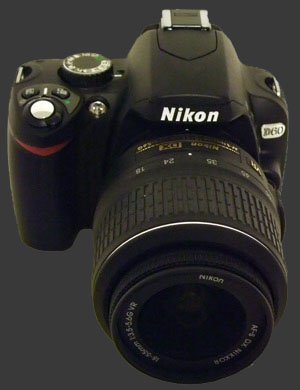
Features, continued:
- Customizable sharpness, contrast, brightness, saturation and hue.
- Customizable function button.
- JPEG and RAW modes.
- Rangefinder manual focus assist.
- Adaptive D-Lighting for high-contrast situations.
- Hardware dust-reduction to reduce the need to clean the image sensor.
Nikon D60 Suitability - What is it good for?
The Nikon D60 is a simple DSLR, yet it remains versatile due to its selection of lenses, wide ISO range and full manual controls. It is suitable for most photographic subjects, although it is not ideal for action photography due to its limited speed continuous-drive and simplistic auto-focus system. The versatility of the Nikon D60 is further ensured by its compatibility with Nikon lenses and compatibility with Nikon Speedlights.
For specific photographic subjects, lens versatility is quite important. The Nikon lens lineup covers a wide variety of focal-lengths from the ultra-wide to the super telephoto. Most 3rd party manufacturers produce lenses for Nikon mounts too. With Nikon, image stabilization is provided by VR (Vibration Reduction) lenses which are available in some, mostly telephoto, lenses.
Being one of the smallest DSLRs currently available, the D60 brings more discretion than is afforded by typical DSLR cameras. While this is a feature that professionals can appreciate, the D60 is not made for changing settings quickly and often. Advanced users should also note the lack of features such as bracketing, depth-of-field preview and critical customization.
Nikon D60 Capability - What can it do?
As noted in the introduction, the Nikon D60 has all basic DSLR capabilities. It also has a built-in dust-reduction mechanism which is becoming standard these days. This Nikon DSLR features a Nikon lens mount with all-electric contacts and, therefore, no mechanical coupling for driving non-CPU auto focus lenses.
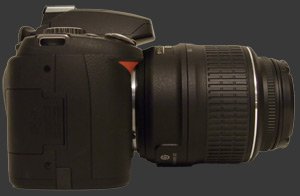
This limits the D60's choice of lenses to recent Nikon and third-party offerings. Lenses which require a mechanical coupling still work but only in manual focus mode. Nikon added a Rangefinder mode to the D60 to focus manually. This mode swaps the exposure indicator in the viewfinder with a focus direction indicator.
The Nikon D60's power-switch surrounds the shutter-release and works in the most obvious way. The shutter-release on this DSLR is a standard 2-stage release with a distinct halfway point. By default, pressing the shutter-release halfway locks focus and exposure. There is an option to disable exposure-locking.
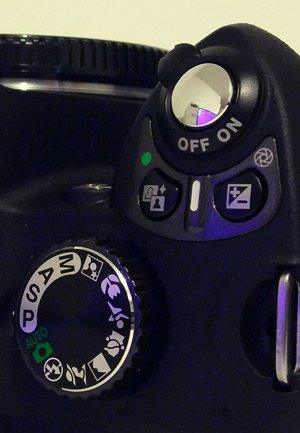 There is also a combined AE-L/AF-L button which can be set to lock both exposure and focus, to lock either focus or exposure, to lock and hold exposure or to activate the auto focus Setting this button to trigger auto focus has the unexpected side-effect of disabling AF activation when pressing the shutter-release halfway. For people who like to be able to lock focus and exposure independently and to lock both without changing settings, you must set the AE-L/AF-L function at AE-L Only and lock exposure first when desired.
There is also a combined AE-L/AF-L button which can be set to lock both exposure and focus, to lock either focus or exposure, to lock and hold exposure or to activate the auto focus Setting this button to trigger auto focus has the unexpected side-effect of disabling AF activation when pressing the shutter-release halfway. For people who like to be able to lock focus and exposure independently and to lock both without changing settings, you must set the AE-L/AF-L function at AE-L Only and lock exposure first when desired.
Exposure modes on the Nikon D60 are controlled by a typical mode-dial. The available modes include the four ubiquitous exposure modes: program (P), shutter-priority (S), aperture-priority (A) and full manual (M) mode. In Manual mode, the shutter-speed selection includes a Bulb mode that keeps the shutter open as long as the shutter-release is pressed. The mode-dial also includes 7 scene modes and an Auto mode.
The Auto mode is not completely automatic but limits use of certain features. Specifically, only 3 flash modes are available, ISO selection includes Auto-ISO and only two focus modes are available. Auto mode disables white-balance, exposure-compensation, flash-compensation, program-shift, metering options and image parameters. This being the right choice of distinction between Program and Auto mode is not certain.
The Auto-ISO behavior of the D60 is a little strange, except in Auto or Scene mode where it behaves as usual. Users normally select between Auto and a preset sensitivity. The camera then honors the selected ISO or, in the case of Auto-ISO, selects an appropriate ISO for the subject. With the D60, the normal metering modes require a specific ISO to be chosen. The selected ISO is honored when the ISO auto option is set to OFF in the Custom Setting Menu. Otherwise, the selected ISO becomes the default and the camera is free to choose a different ISO.
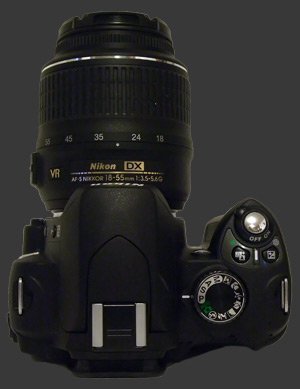
The Nikon D60 has detailed control over white-balance including automatic white-balance, preset white-balanceIncandescent, Fluorescent, Sunlight, Flash, Cloudy and Shade., and custom white-balance. All white-balance options can be fine-tuned in 13-steps from magenta to green and blue to amber. There is a single custom white-balance memory slot which can be set by taking a picture of a white object or by using an existing picture as reference.
Exposure compensation can be adjusted in 1/3 EV increments using the exposure compensation button combined with the command dial. The range of exposure compensation is -5 to +5. This is more range than most digital cameras. The exposure steps are always fixed at 1/3 EV though. It would be really nice if 1/2 EV steps were allowed too because they produce distinct aperture and shutter-speed choices. This is the sort of price to pay expected from an entry-level DSLR.
Next to the EC button is the Active D-Lighting button. This one enables to scroll through the two modes of Active D-Lighting: ON or OFF. Needless to say, a toggle-switch would have been better. The placement of the Active D-Lighting button is a prime location because it is easily reachable and usable in conjunction with the control-wheel. Seems like this button would have been better used if it controlled ISO or WB instead.
Active D-Lighting is Nikon's automatic image contrast correction feature. This feature brightens darker areas to produce a less contrasty image. For high contrast scenes this can produce an image with more detail while adding to the shadow noise. Low contrast scenes are generally unaffected by D-Lighting. Medium contrast scenes are a little hit-or-miss with Active D-Lighting because they can lose their punch when the contrast is reduced too much.
This Nikon supports the standard drive modesSingle, continuous and self-timer., remote-trigger and delayed mirror-trigger. In continuous drive mode, the D60 can shoot an unlimited number of JPEG images at 3 FPS. The self-timer is customizable with possible 2s, 5s, 10s and 20s delay. Each time the self-timer is used, it resets itself. Those who experiment with multiple shots from a tripod will find this behavior rather annoying. The ideal implementation of this is the one devised by Minolta where short timers do not reset themselves but long ones do.
By default, the drive mode is selected using the Function (Fn) button. This button can also be customized to toggle the self-timer, select image quality, select ISO sensitivity or select white-balance.
The Nikon D60 supports JPEG and RAW images. JPEG images are available in 3 quality levels. There are also 3 image sizes available. A combined JPEG+RAW mode is also selectable and always produces basic JPEG files.
The image sensor is mounted on a moving plate which serves to shake off dust, reducing its accumulation. While we have not measured its efficiency, these systems are generally not 100% effective and they only remove the lightest of dust-particles. Any significantly stuck particle requires manual cleaning.
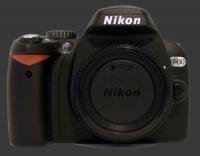 |
Please Support Neocamera
All information on Neocamera is provided free of charge yet running this website is a huge endeavor. Purchases made via affiliate links found throughout the site help keep it running and up-to-date. There is no additional cost to you, so please consider buying via these links to our affilates:
If you found any information on this site valuable and did not purchase via our affiliate links, please considering donating via PayPal:
Any amount will be greatly appreaciated. Thank you for your support!
Nikon D60 Highlights

Sensor-Size: 24 x 16mm

Actual size when viewed at 100 DPI
| 10 Megapixels DSLR | ISO 100-3200 |
| Nikon F Mount 1.5X FLM | Shutter 1/4000-30s |
| 95% Coverage Medium Viewfinder | Full manual controls, including Manual Focus |
| Automatic Eye-Start sensor | Custom white-balance with 2 axis fine-tuning |
| Built-in Dust Reduction | Spot-Metering |
| 3 FPS Drive, Unlimited Images | Hot-Shoe |
| 3" LCD 230K Pixels | Lithium-Ion Battery |
| Secure Digital High Capacity |
Updates
2024.11.18

Best 2024 Photography Gifts for Every Budget
Great gifts for photographers and photo enthusiasts selected for every budget among the best products of 2024.
2024.08.07

Eye Protection Tips for Professional Photographers
The four main considerations for professional photographers regarding eyewear.
2024.07.14

Fujifilm X100VI Review
Flagship fixed-lens compact digital camera with a 40 MP sensor and Image-Stabilization, a first for the series. Retro design featuring dual control-dials, plus direct ISO, Shutter-Speed and EC dials. Its hybrid viewfinder can switch between EVF and OVF mode.
2024.05.09

Fujifilm GFX100 II Review
Flagship 102 Megapixels Medium-Format Mirrorless Digital Camera with 8-Stop 5-Axis IBIS, 8 FPS Drive, 8K Video and 400 MP Super-Resolution capture in a weatherproof and freezeproof body with dual control-dials and dual memory-card slots.
2024.04.03

Fujifilm X-T5 Review
Newest Fujifilm flagship boasting a 40 MP APS-C sensor, 5-axis IBIS with 7-stop efficiency, 15 FPS continuous drive, 6.2K Video capture, dual control-dials and dual SDXC UHS-II slots in a sturdy weatherproof and freezeproof body.
2023.11.20

Best Digital Cameras of 2023
Find out which are the Best Digital Cameras of 2023. All the new Mirrorless Digital Cameras from entry-level to high-end professional.
2023.07.10

Fujifilm X-H2 Review
40 Megapixels APS-C Hybrid Mirrorless Digital Camera with 7-stop IBIS. Fastest shutter ever and 8K video capture. Large builtin EVF with 0.8X magnification and 5.8 MP, plus an Eye-Start Sensor. Packed with features and large number of controls in a weatherproof and freezeproof body.
2023.05.07

Sony FE 20-70mm F/4G Review
Review of the unique Sony FE 20-70mm F/4G lens. The optical zoom of this lens spans ultra-wide-angle and medium focal-length coverage, making it one of the most versatile Full-Frame lenses on the market.
2023.01.15

Huion Inspiroy Dial 2 Review
Review of the Huion Inspiroy Dial 2 tablet, a medium sized drawing surface with dual dials and customizable buttons. Connects via USB-C or Bluetooth 5.0 with Windows, Linux and Android support.
2022.12.08

How to Pack for a Photo Trip
Find out how to pack for a travel photography trip, carry your gear safely while meeting airline regulations.
2022.11.13

Best Digital Cameras of 2022
The best digital cameras of 2022. A short list of the most outstanding models in their respective categories. Choose one for yourself or as a gift.
2022.09.21

Pentax DA* 60-250mm F/4 SDM Review
Review of the Pentax DA* 60-250mm F/4 SDM, the constant-aperture telephoto zoom with the highest zoom-ratio on the market.










